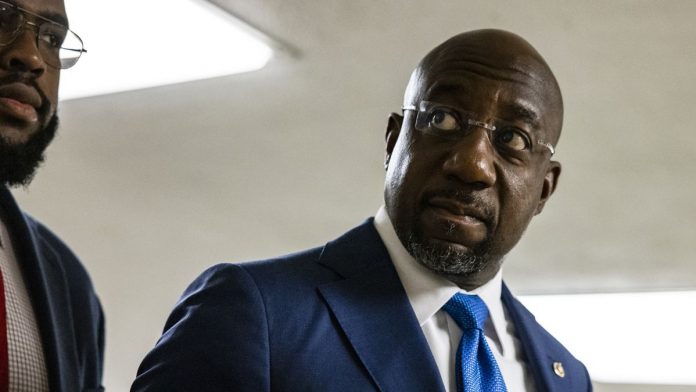Warnock’s political career — and democracy in Georgia — could hinge on the most dangerous provision of the state’s new voter suppression law.
Late last month, Georgia Republicans began a process that could end with them seizing control of election administration in Fulton County — a Democratic stronghold that encompasses most of Atlanta.
Under Georgia’s new election law, SB 202, the GOP-controlled state elections board may remove a county’s top election officials and replace them with a temporary superintendent (although this process will likely take months as the board has to jump through a few procedural hoops first). Once such a superintendent is in place, they can disqualify voters, move polling places, and even potentially refuse to certify election results.
Voter suppression laws are nothing new, even in the post-Jim Crow era. And Georgia’s SB 202 is hardly the first effort by Republican state lawmakers to skew elections by making it harder for Democratic constituencies to cast a ballot.
But prior efforts to restrict the franchise frequently placed unnecessary hurdles in the way of voters, such as by requiring them to show certain forms of ID or by limiting where and when voters can cast their ballot. These sorts of laws are troubling, but they can be overcome by determined voters.
SB 202, by contrast, is part of a new generation of election laws that target the nuts and bolts of election administration, potentially allowing voters to be disenfranchised even if they follow the rules.
Because state voter suppression laws targeting ballot counting and election certification are relatively new, Democrats did not come into 2021 with a legislative proposal to address these laws. Democratic leaders’ primary voting rights bill, the For the People Act, includes a grab bag of provisions intended to neutralize state laws making it harder to vote. But the For the People Act’s drafters did not anticipate something like SB 202’s provisions allowing the Republican Party to take control of election administration in Democratic counties.
Which brings us to the Preventing Election Subversion Act of 2021, a bill introduced by Sen. Raphael Warnock (D-GA) that seeks to fill that gap.
It doesn’t prevent Georgia’s elections board from removing a local election official, but it does impose some procedural safeguards intended to prevent local officials from being removed for partisan reasons. Among other things, it allows such officials to sue for reinstatement in federal court.
Additionally, the bill would make it a felony to harass or intimidate election workers in order to interfere with their official duties. GOP lawmakers in some states, including Texas, are pushing legislation making it harder for election workers to remove partisan observers who disrupt an election. Warnock’s bill would subject the worst-behaved election observers to criminal charges.
Realistically, Warnock’s bill has a long way to go before it becomes law. Warnock is reportedly in negotiations with Senate Majority Leader Chuck Schumer and Sen. Joe Manchin (D-WV) to include safeguards against “election subversion” in a package of voting rights reforms that enjoys Manchin’s blessing. As the most conservative Democratic senator in an evenly divided Senate, Manchin is key to advancing any meaningful voting rights legislation.
And, even if Manchin signs on to the Preventing Election Subversion Act, that support is unlikely to amount to much unless Democratic senators unanimously agree to eliminate the GOP’s power to filibuster voting rights bills. Plus, there’s always a risk that an increasingly conservative judiciary will refuse to enforce new voting rights legislation.
But, at the very least, this bill is a sign that Democrats understand that the GOP recently escalated its tactics in the voting rights war, and that Democrats — and democracy — need an adequate countermeasure.
What exactly could the Preventing Election Subversion Act do in Georgia?
SB 202 presents a devilish problem for federal policymakers.
On its face, SB 202 creates a process that can be used to remove local elections officials who violate the law, or who demonstrate “nonfeasance, malfeasance, or gross negligence in the administration of the elections.” Few people would argue that election officials who repeatedly break the law, or who prove incapable of doing their jobs well, should remain in office. It’s entirely reasonable for a state to create a nonpartisan process to remove officials who are bad at their jobs.
The problem with SB 202, however, is that, in effect, it creates a partisan process to remove local elections officials. The bill ensures that Republicans will control four of the five seats on the state elections board for as long as the GOP controls both chambers of the state legislature. (As they have since 2005.) And it removes Secretary of State Brad Raffensperger, a Republican who rebuffed former President Donald Trump’s attempts to toss out Joe Biden’s victory in Georgia’s 2020 election, as chair of the state board.![]()
SOURCE ⇒ VOX





































